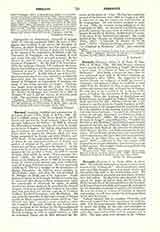
Adolphe Perraud
Cardinal and academician; b. at Lyons, France, Feb. 7, 1828; d. Feb. 18, 1906

Perraud, ADOLPHE, cardinal and academician; b. at Lyons, France, February 7, 1828; d. February 18, 1906. He had a brilliant career at the lycées Henri IV and St. Louis, and entered the Ecole normale, where he was strongly influenced by Gratry. In 1850 he secured the fellowship of history and for two years he taught at the lycée of Angers. In 1852 he abandoned teaching to embrace the sacerdotal state. He returned to Paris where he joined the Oratory which was then being reorganized by Gratry and Abbé Pététot, cure of St. Roch. On his ordination in 1855 after a sojourn at Rome he was appointed professor of history and prefect of religion at the petit séminaire of St. Lô which had just been confided to the Oratory. At the same time he devoted himself to preaching, for which purpose he was recalled to Paris. In 1860 he visited Ireland, after which he wrote “Contemporary Ireland” (1862). In 1865 he defended a theological thesis at the Sorbonne, where in 1866 he became professor of ecclesiastical history and dealt brilliantly with the history of Protestantism. He was appointed (1870) by E. Ollivier a member of the Committee of Higher Education. In 1870 he was a chaplain in MacMahon’s army, and after the war preached at St. Philippe du Roub and at St. Augustine. Made Bishop of Autun in 1874 despite his liberal tendencies, he interested himself especially in working-men. After the catastrophe of Montceau les mines, in which twenty-two miners perished, he preached the funeral sermon; he gave several Lenten courses in his cathedral and preached the funeral sermons of Cardinal Guibert, Cardinal Lavigerie, and MacMahon. He was actively concerned in the improvement of clerical studies in which connection his sermon (1879) on “the Church and light” caused a great sensation; after the Congress of Brussels (1894) he was named honorary president of the Society for the Encouragement of Higher Studies among the Clergy. Elected to the French Academy in 1882 to replace Barbier, in 1885 he welcomed Duruy and in 1889 delivered the discourse on the prizes of virtue. Having been superior-general of the Oratory from 1884, he resigned in 1901 in order not to sign the request for authorization of his congregation. He was created cardinal in petto, January 16, 1893, the creation being published at the Consistory of 1895. At the conclave of 1903 he energetically opposed the movement of exclusion directed against Rampolla by Puczina, Archbishop of Cracow, in the name of the Austrian Government. His works consist of the “Etudes sur l’Irlande contemporaine” (Paris, 1862); “L’Oratoire de France au XVIIe siècle” (1865); “Paroles de l’heure présente” (1872); “Le Cardinal de Richelieu” (1872); also oratorical works.
J. LATASTE

